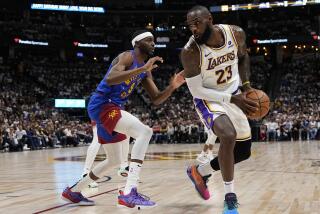AFTER 191--DAY LOCKOUT, THE NBA IS...Back in Business
- Share via
NBA Commissioner David Stern used to love to remind whoever would listen that his was the only major professional sports league not to lose a game to labor disagreements.
If that statistic really meant something to him, he would have done more to protect it.
The NBA lost 428 games this season before he and union head Billy Hunter finally reached an agreement early Wednesday morning. The record will show they all came on Stern’s watch.
When the NBA was riding high, Stern constantly was described as a marketing genius.
That used to really rankle Charles Grantham, the former union leader. His background isn’t in marketing, Grantham would sniff, he’s a lawyer.
Stern’s true nature surfaced during this labor dispute. As a negotiator, Stern’s tactics worked perfectly. But this owner-imposed lockout was a public relations disaster.
The same man who presided over the league’s unprecedented growth and popularity just helped sports fans learn how easily they can live without the NBA.
They turned their heads and found other things to do while the owners and players argued over what amounted to nickels and dimes in this $2-billion industry.
The fans didn’t care who won--and no doubt about it, this new agreement is a “W” for the owners.
Likewise, Stern didn’t care about the fans. Or the peanut vendors or the ushers or the parking attendants, who all lost money during the lockout.
They were crushed like those nameless villages when Godzilla and King Kong duked it out. (In this case it was Stern vs. super-agent David Falk.)
The Falk-led high-end players ignored the fans and even their lower-paid fellow players. What the players were fighting for wouldn’t affect the majority of the union.
But this was supposed to be about principle, that this is America and a person should have the right to make as much money as he can. If Patrick Ewing were acting in his own self-interest, he would have argued to settle on Day 1 to collect as much of his $20.1-million salary as possible. Instead, he wanted to give those who followed him a chance to make the same kind of money.
Some principles. By agreeing to this deal, which brought an end to the unlimited salaries made possible under the Larry Bird exception, all the union managed to do was waste everyone’s time. They panicked at the thought of no money and caved. Years of shortsightedness and failing to develop other marketable skills came back to haunt them.
Because both sides acted so childishly at times during the lockout (the owners walking out of a negotiating session in a huff last summer, league and union lawyers bickering over how to deliver the union’s final offer with the drop-dead date only days away), we’ll use an old sibling-rivalry accusation for Stern: He started it.
From 1997 on, Stern was counting down the days until the owners could reopen the labor agreement and lock out the players. He turned this into a power struggle between himself and Falk for the future of the league.
There’s an old saying: You shouldn’t wrestle with a pig; you’ll both get dirty, and the pig likes that.
Stern could have consulted just about any general manager in the league and learned that if you pick a fight with Falk, it’s going to get ugly. And if Falk doesn’t get his way (which he usually does), he’ll make you wish you hadn’t won.
This wasn’t all about money for the owners. If the league were in such dire financial straits there would be a mass sell-off of franchises. The players made $100 million more than what the owners deemed acceptable in 1997-98, but Michael Jordan’s salary accounted for a third of that. Besides, name a business in which every owner is guaranteed profits. Stern was victorious, and he’ll continue to rule the NBA. But is that a kingdom worth having anymore?
Stern had the good fortune of starting his term as commissioner in 1984, the same year Magic Johnson and Larry Bird had the first of their three NBA finals battles and Jordan entered the league. The landmark collective bargaining agreement, in which the players conceded a salary cap, was in place.
Stern’s greatest asset was his global vision. Today it’s hard to find a country with no NBA merchandise.
At the NBA finals a couple of years ago, he was asked what he considered the greatest accomplishment of his tenure. Stern said he was proudest that a league that had once been considered “too black” and too drug-infested could reach such levels of popularity, and that the most recognizable athlete in the world could be an African American from a team sport--Jordan.
Those definitely were signs of progress. But Stern was arrogant if he thought the NBA had entrenched itself so deeply in the sporting world that it could survive a shutdown of an entire season. Or even half.
He’ll send out a league full of hastily thrown-together rosters of out-of-shape players as a way of enticing the fans back. And either this “season” or the next one, he’ll have to cope with the loss of Jordan.
Attendance and ratings will drop and who knows if they will recover soon. There’s no need to ask Stern what his most significant accomplishment is anymore. By bringing about this lockout, he sealed his legacy.
When the bus comes around to take the sports commissioners to retirement, he can take a seat next to Bud Selig.
J.A. Adande can be reached at his e-mail address: j.a.adande@latimes.com
More to Read
Go beyond the scoreboard
Get the latest on L.A.'s teams in the daily Sports Report newsletter.
You may occasionally receive promotional content from the Los Angeles Times.










